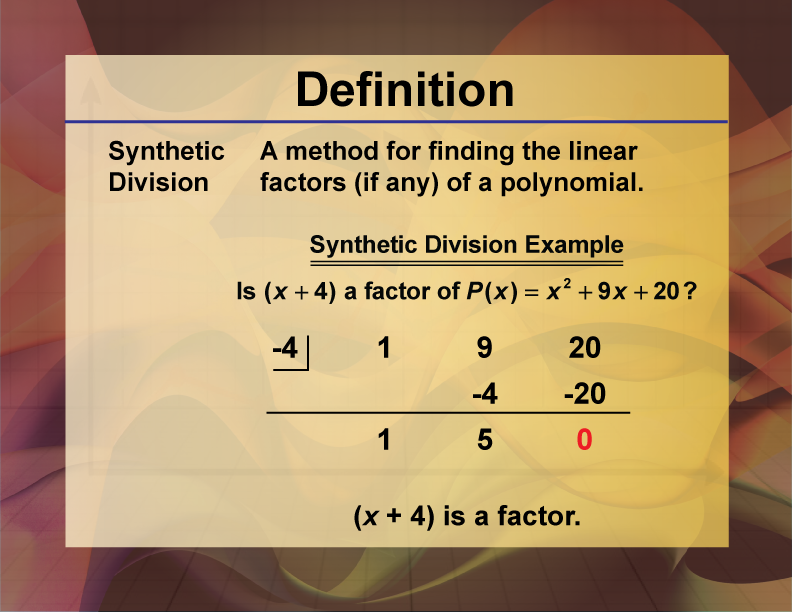
Display Title
Definition--Polynomial Concepts--Synthetic Division
Display Title
Synthetic Division

Topic
Polynomials
Definition
Synthetic division is a simplified method of dividing a polynomial by a linear divisor, typically of the form (x - c).
Description
Synthetic division is a streamlined method for dividing a polynomial by a linear divisor, typically of the form (x - c). This technique simplifies the division process, making it faster and easier to perform than traditional long division. Synthetic division is particularly useful for solving polynomial equations and for analyzing polynomial functions.
Understanding synthetic division is crucial for mastering algebraic techniques and for progressing to more advanced mathematical topics. It provides a systematic way to divide polynomials and to find roots and factors efficiently. Synthetic division is also a stepping stone to more advanced operations such as polynomial factorization and the application of the Remainder and Factor Theorems.
In practical applications, synthetic division is used in fields such as physics, engineering, and economics to model and analyze real-world phenomena. It helps in understanding the dynamics of systems, predicting trends, and solving complex problems involving polynomial relationships. Mastery of synthetic division enhances problem-solving skills and provides a foundation for understanding more complex algebraic and calculus concepts.
For a complete collection of terms related to polynomials click on this link: Polynomials Collection
| Common Core Standards | CCSS.MATH.CONTENT.HSA.APR.A.1, CCSS.MATH.CONTENT.HSA.APR.B.2, CCSS.MATH.CONTENT.HSA.APR.C.5, CCSS.MATH.CONTENT.HSA.APR.C.4, CCSS.MATH.CONTENT.HSA.APR.B.3, CCSS.MATH.CONTENT.HSF.IF.C.7.C |
|---|---|
| Grade Range | 8 - 12 |
| Curriculum Nodes |
Algebra • Polynomials • Polynomial Expressions |
| Copyright Year | 2021 |
| Keywords | polynomials, monomials, definitions, glossary term, synthetic division |